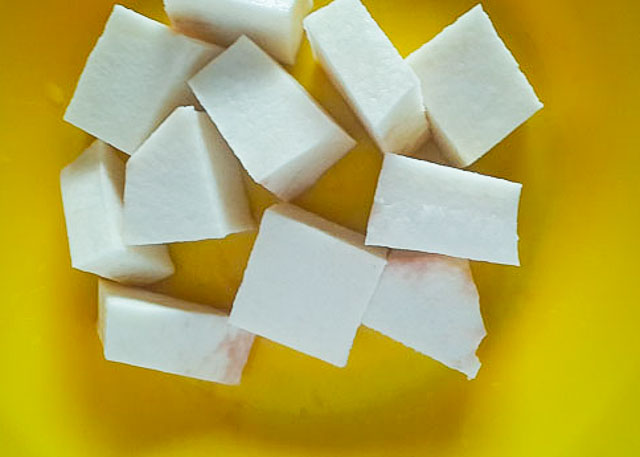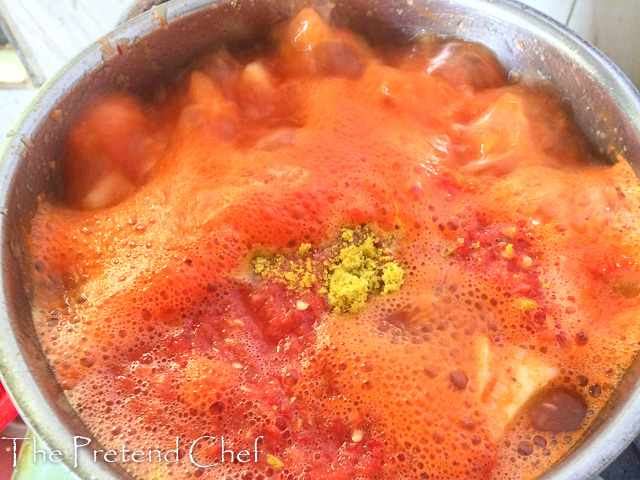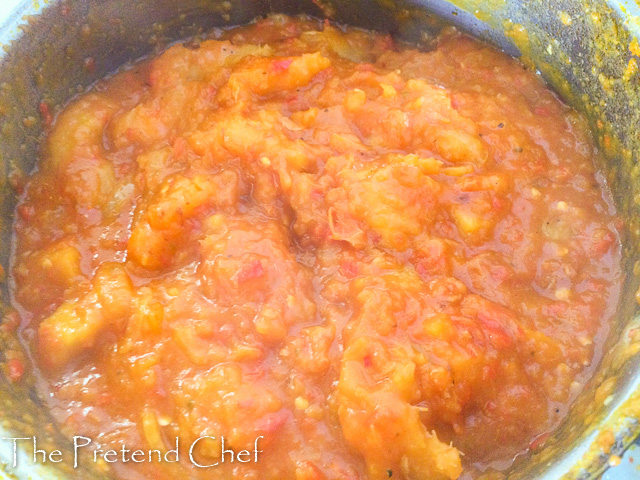Asaro is an easy one-pot dish of yam porridge/pottage which is popular in western Nigeria. Different from the other type of yam porridge, Asaro is cooked with tomatoes and peppers, then mashed to a complete puree or with a few lumps of yam left unmashed for texture.
It is most times cooked without any leafy vegetables or herbs. The addition of leafy vegetables and herbs is totally optional e.g ugu, green amaranth, curry leaves (partminger) etc. If you read my post on yam porridge, you will know that it is one of the dishes that really float my boat.

There are so many ways to add to the deliciousness of Asaro, you can include meat, dry fish, smoked fish, ponmo (canda, cow skin) etc. Sometimes a little sugar is added to Asaro, especially by bukas. This might come in handy when the new yams have just come out, yam at this stage is still quite bland because of high water content.
Some people use vegetable oil in place of palm oil, I have never tried it. You can also add coconut milk or meat stock for added flavour. Asaro can be served with pepper sauce or stewed meat/fish.
Asaro follows the same guidelines as my Yam porridge.
To prepare Asaro (yam porridge)
1.2 kg yam 140g fresh tomato 60g Tatashe 80g shombo (fresh cayenne pepper) 3 scotch bonnet (fresh pepper) 2 medium onions (180g) 1/4 cup ground crayfish 2 seasoning cubes salt 1/2 cup palm oil
Cut and peel yam, cut into 1-inch cubes and rinse in a bowl of water.

Grind together tomatoes, tatashe, shombo, scotch bonnet and 1/2 of the onions.
Slice the other half of the onions and set aside.
Place yam in a pot, add 2 cups of water and stock (if using), place over medium-high heat.
Add ground tomato mix, crayfish, seasoning cubes and a little salt.
Add palm oil and sliced onions.

Cover and cook till the yam is very soft and the liquid very much reduced.
Use a potato masher or wooden spoon and mash the pieces of yam, leaving some whole.

Reduce the heat and cook for about 5 minutes, stirring from time to time.
Notes
- If using meat and stockfish, wash and season with salt and seasoning cube, boil until soft.
- If using dry fish, soak in hot water for 2 minutes, drain and rinse well in cold water. Debone the fish.
- Add meat or dry fish with the other ingredients.
- Be careful when adding salt because when the Asaro thickens, the concentration of the salt will be more.

Asaro (yam porridge)
Ingredients
- 1.2 kg yam
- 140 g fresh tomato
- 60 g Tatashe
- 80 g shombo (fresh cayenne pepper)
- 3 scotch bonnet (fresh pepper)
- 2 medium onions (180g)
- ¼ cup ground crayfish
- 2 seasoning cubes
- salt
- ½ cup palm oil
Instructions
- Cut and peel yam, cut into 1-inch cubes and rinse in a bowl of water.
- Grind together tomatoes, tatashe, shombo, scotch bonnet and 1/2 of the onions.
- Slice the other half of the onions and set aside.
- Place yam in a pot, add 2 cups of water and stock (if using), place over medium-high heat.
- Add ground tomato mix, crayfish, seasoning cubes and a little salt.
- Add palm oil and sliced onions.
- Cover and cook till the yam is very soft and the liquid very much reduced.
- Use a potato masher or wooden spoon and mash the pieces of yam, leaving some whole.
- Reduce the heat and cook for about 5 minutes, stirring from time to time.
Notes
- If using meat and stockfish, wash and season with salt and seasoning cube, boil until soft.
- If using dry fish, soak in hot water for 2 minutes, drain and rinse well in cold water. Debone the fish.
- Add meat or dry fish with the other ingredients.
- Be careful when adding salt because when the Asaro thickens, the concentration of the salt will be more.
You will also enjoy my Yam Porridge (Yam Pottage), Vegetable Yam Porridge, Achicha (dry cocoyam) and Plantain Porridge.
Do you have any comments, questions or suggestions, please leave a comment below.
Share this recipe using the share buttons. Subscribe to the blog for instant notifications of new recipes.
Follow on Instagram: @thepretendchefofficial, Twitter: @thepretendchef Facebook: https://web.facebook.com/thepretendchef/ and Pinterest: https://www.pinterest.com/thepretendchef/


 I am Ganiru, a wife, a mother, a food blogger, a chef, an author and an accountant. I love to cook and write about food, especially Nigerian and afro-centric food...
I am Ganiru, a wife, a mother, a food blogger, a chef, an author and an accountant. I love to cook and write about food, especially Nigerian and afro-centric food...